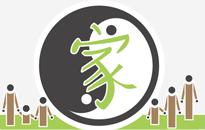Family doctors for parents & children
HOLISTIC
FAMILY
MEDICINE
Chinese Dietetics
„Medicine and nutrition have the same origin.”
Chinese proverb
The art of cooking and food have always been important parts of the fine culture of China. Food is not only eaten for enjoyment, but is also closely related to the seasons and associated with considerations for health. Nutrition is an important part of treatment In traditional Chinese medicine on the way to healing.
Within Chinese medicine, food substances are classified, similar to herbal drugs, according to their properties. These refer to their nature ( from cool, cold, neutral, warm to hot), their taste (spicy, sweet, neutral, sour, bitter, salty) and their relationship to the five elements (earth, metsal, water, wood, fire) and thus to the internal organs (Zhang Fu). The way of preparation of the food, e.g. frying or baking, contributes to the temperature of the dish.
Here are some examples: as a group, the different grains (e.g. wheat, rice, oats, barley) are “warm and sweet”. They belong to the element “earth” ( organ system of spleen and stomach) and supports “the middle” of the body, i.e. the digestive system. Fruits and raw vegetables are “cold”. In the summer, salads could be cooling and good. Vegetables should rather be cooked in the winter than eaten raw and cold. Meat is “warm to hot” and is strengthening especially in the winter. Depending on the constitutional type, symptoms, diagnosis and the season, certain foods would be selected which the patient should consume or avoid during the treatment.
Many diseases start from a “weakness of the middle”, this referring to the gastrointestinal tract and digestive system. Grains such as rice and oats are very suitable during illness, especially for children, because of their supportive character and relationship to the digestive system. The habit of drinking a glass of cold orange juice from the refrigerator first thing in the morning is unfavourable, because “the coldness weakens the spleen”. Skin problems, e.g. the acne of young people, are often associated with “heat in the stomach”. “warm” or “hot” foods such as coffee and sweets, or dishes which bring heat because of the way there are prepared, e.g. french fries, or baked products, should be avoided. Vegetables, above all salads and fruits, are recommended because of their cooling effect. Milch products are “cool”. They should be avoided when there is “dampness” resulting from a weakness of the spleen and stomach, e.g. in the case of ecema and recurrent respiratory tract infections.
We advice you accordingly in the TCM consultations and can refer you to qualified dieticians for detailed dietary planning if necessary.


